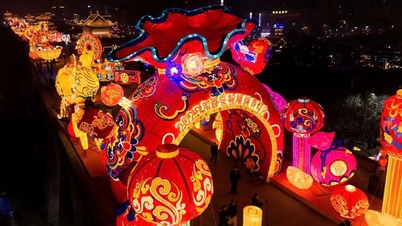Why does the above semantic shift occur? Well, suddenly is a polysemous word, the way this word is understood depends on the social context and the era.
The character "dut" (突) first appeared in the Shang Dynasty Oracle Bone Inscriptions, consisting of two parts: the upper part is the character " huot" (穴: cave), the lower part is "khuyen" (犬: dog). The ancient shape of "dut" resembles a dog rushing out of a cave; the original meaning is to rush out very quickly ( Records of the Three Kingdoms, Wei Zhi, Wu Di Ji ). This meaning was recorded in Shuowen Jiezi: "dut, khuyen tung huyet trung tem xuat da" ( dut is a dog temporarily coming out of a cave).
Later, the word " dat" expanded its meaning to "attack", "insult", "speed", especially "a situation that changes rapidly and unexpectedly"...
Wu (兀) is a character that first appeared in the Oracle Bones and Bronze Steles of the Shang Dynasty. This character originally meant human head. The head is the highest point of the human body, so Wu also means towering and protruding.
Besides, "ngọt" is also used to mean "tall and outstanding appearance" (Preface to the Nanyang Gongji by Lu Zhaolin); "independence" ( Tran luan by Yu Dat Phu); "confused and ignorant look" ( Du Thien Thai Son phu by Sun Xuo) or "rest" ( Van phu by Lu Ji)...
The compound word "sudden" (突 兀) was first seen in the poem "Hai fu" by Mu Hua of the Western Jin Dynasty. This word has many meanings, such as "outstanding" ( The world's new language. Pham tao ) or "strange, different" ( Mo ki by Wang Zhi of the Song Dynasty).
During the Tang Dynasty, "sudden" was also a word used to describe "tall and steep" terrain (Du Fu's Mao oc vi thu phong so pha ca ) or "unexpected events" (Han Yu's Tong tang Trung Quan ).
Abruptness is also a word that refers to appearance, for example "sitting straight and upright" ( Bai Ai Thi by Du Fu) or "tall appearance" (Preface to Nan Yang Gong Ji by Lu Zhao Lin).
Since the Ming and Qing dynasties, sudden twists have appeared in other meanings, such as a sudden change of plot in a novel.
In general, since the 10th century, Chinese characters have gradually become popular in our country. The word "dot dot " (突 兀) still represents the above meanings. However, in recent centuries, this word has only had a few meanings:
- Suddenly (突兀) means "unfamiliar, unfamiliar: Just arrived and suddenly" ( Dai Nam Quoc Am Tu Vi by Huynh-Tinh Paulus Cua, 1895, p.719).
- Sudden means "suddenly, unexpectedly: Suddenly arise, happen suddenly" ( Vietnamese-Vietnamese-Dictionary by Le Van Duc, edited by Le Ngoc Tru, volume 1, 1970, p.490).
- Suddenly means "very unexpectedly, without any warning signs: The weather suddenly turned cold" ( Vietnamese Dictionary , op. cit., p. 370).
Thus, in Vietnamese, "suddenly" is synonymous with two words: suddenly and unexpectedly :
1. Suddenly , written in Nom script as 声 灵 and 盛 令, appeared in the story Duong Tu-Ha Mau by Nguyen Dinh Chieu ( Phut dau co ngam nhong nhong nhong lop ) or in Nhi do mai dien ca ( Suddenly the table lost its joy ).
2. Unexpected , a combination of two words: bất (Han) and ngh (Nom), appeared at the latest from the beginning of the 20th century, for example in the book The Country Boy ( Le Petit Campagnard , 1925) by Nguyen Lan, translated by Alfred Bouchet (p.67) or in the sentence "the surprises of life, who can avoid them" ( Trang by Lan Khai, Tan Van Publishing House, 1939).
Source: https://thanhnien.vn/dot-ngot-la-cao-chot-vot-185250822215348278.htm





![[Photo] Hanoi morning of October 1: Prolonged flooding, people wade to work](https://vphoto.vietnam.vn/thumb/1200x675/vietnam/resource/IMAGE/2025/10/1/189be28938e3493fa26b2938efa2059e)
![[Photo] President of the Cuban National Assembly visits President Ho Chi Minh's Mausoleum](https://vphoto.vietnam.vn/thumb/1200x675/vietnam/resource/IMAGE/2025/10/1/39f1142310fc4dae9e3de4fcc9ac2ed0)



























































































Comment (0)